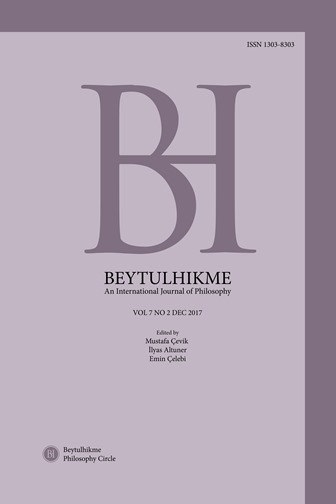Author :
Abstract
Dış dünyanın varlığı konusu felsefe tarihinde çoğu zaman epistemolojik bir sorgulamanın içinde yer almaktadır. Pek çok filozof dış dünyanın varlığının bilinip bilinemeyeceği ya da nasıl bilineceği sorularıyla meşgul olmuştur. Bu filozoflardan biri de David Hume’dur. Hume dış dünyanın varlığına ilişkin tasarımlarımızı inancın konusu olarak ele almaktadır. Dış nesnenin algılanmadığında bile devamlı ve ayrı var olduğu inancını sorgulamaktadır. Bu çalışmada dış dünyanın varlığının algıdan bağımsız ve ayrı bir şekilde var olduğu inancının nasıl türetildiği; bunun türetilmesinde hangi yetimizin etkin olduğu araştırılacak ve daha sonra bu tartışmayla Hume’un niyetinin, bu türden bir inancın epistemik değerini ortaya koymak olduğu iddia edilecektir.
Keywords
Abstract
The subject of the existence of the external world is mostly located in an epistemological inquiry in the history of philosophy. Many philosophers have dealt with the question of whether the existence of the external world could be known or not or how it could be known. One of these philosophers is David Hume. Hume tackles our ideas about the existence of the external world as a matter of belief. He questions the belief in the continued and distinct existence of external objects even when are not perceived. In this study, it will be investigated how the belief of the external world that is the continued and distinct from our mind and our perception is derived, and which faculty is active in the production of the belief; and then, with this debate, it will be claimed that the intention of Hume is to reveal the epistemological value of such a belief.
Keywords
- Aune, B. (1991). Knowledge of the External World. London & New York: Routledge.
- Baxter, D. L. M. (2006). Identity, Continued Existence, and the External World. The Blackwell Guide to Hume’s Treatise (ed. S. Traiger). USA: Blackwell Publishing, 114-133.
- Butler, A. (2008). Natural Instinct, Perceptual Relativity, and Belief in the Exter- nal World in Hume’s Enquiry. Hume Studies, 34 (1), 115-158.
- Chappell, V. C. (1995). Hume on What There Is. David Hume: Critical Assessment, vol. III (ed. S. Tweyman). London & New York: Routledge, 77-88.
- Collier, M. (1999). Hume and Connectionism on the Continued Existence of Unperceived Object. Hume Studies, 25 (1-2), 155-170.
- Costa, M. J. (1995). Hume and the Existence of an External World. David Hume: Critical Assessment, vol. III (ed. S. Tweyman). London & New York: Routledge, 555-565.
- Çevik, M. (2005). David Hume’un Bilgi Kuramı. Ankara: İlahiyat Yayınları.
- Dicker, G. (1998). Hume’s Epistemology and Metaphysics. London & New York: Routledge.
- Fogelin, R. J. (2009). Hume’s Skepticism. The Cambridge Companion to Hume (eds. D. F. Norton, & J. Taylor). New York: Cambridge University Press, 209-238.
- Hume D. (2007). An Enquiry Concerning Human Understanding (ed. P. Millican). New York: Oxford University Press.
- Hume, D. (2009). İnsan Doğası Üzerine Bir İnceleme (çev. E. Baylan). Ankara: Bilge- Su Yayıncılık.
- Loeb, L. E. (2002). Stability and Justification in Hume’s Treatise. Oxford: Oxford University Press.
- Noonan, H. W. (1999). Hume on Knowledge. London & New York: Routledge.
- Stroud, B. (1977). Hume. London & New York: Routledge.
- [*] Bu makale, Nurten Öztanrıkulu Özel tarafından, 2016 yılında İstanbul Üniversitesi Sosyal





